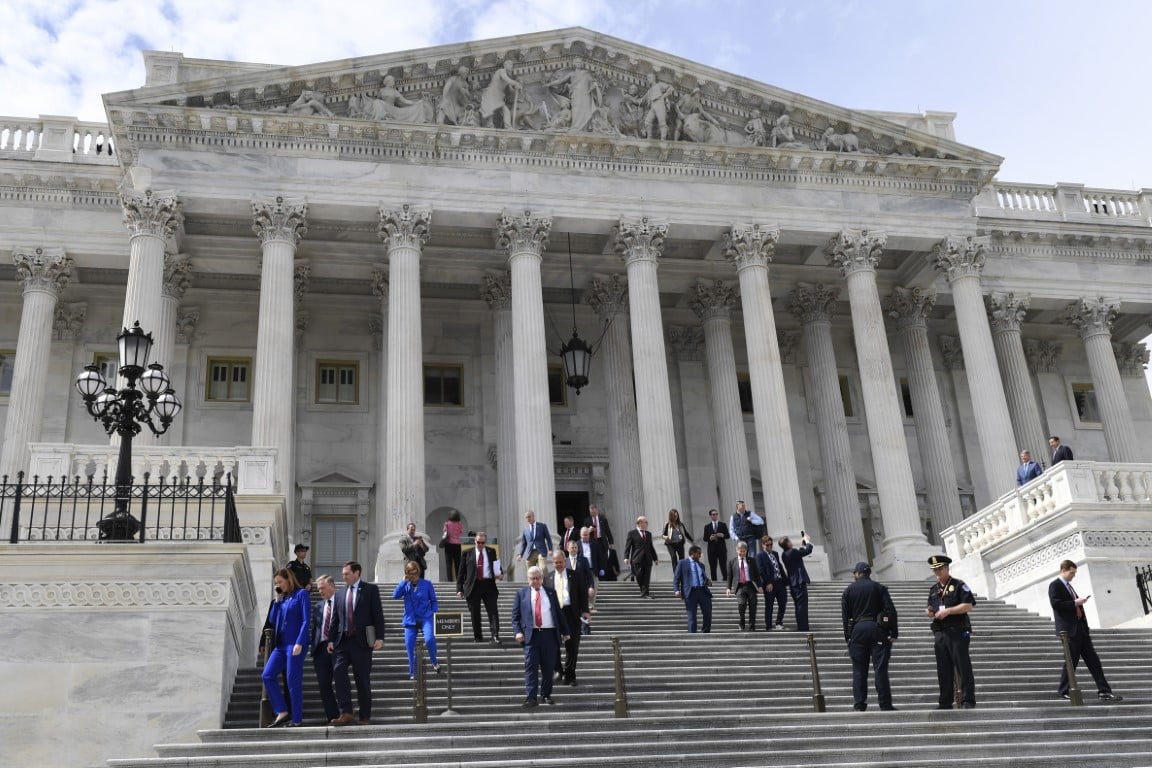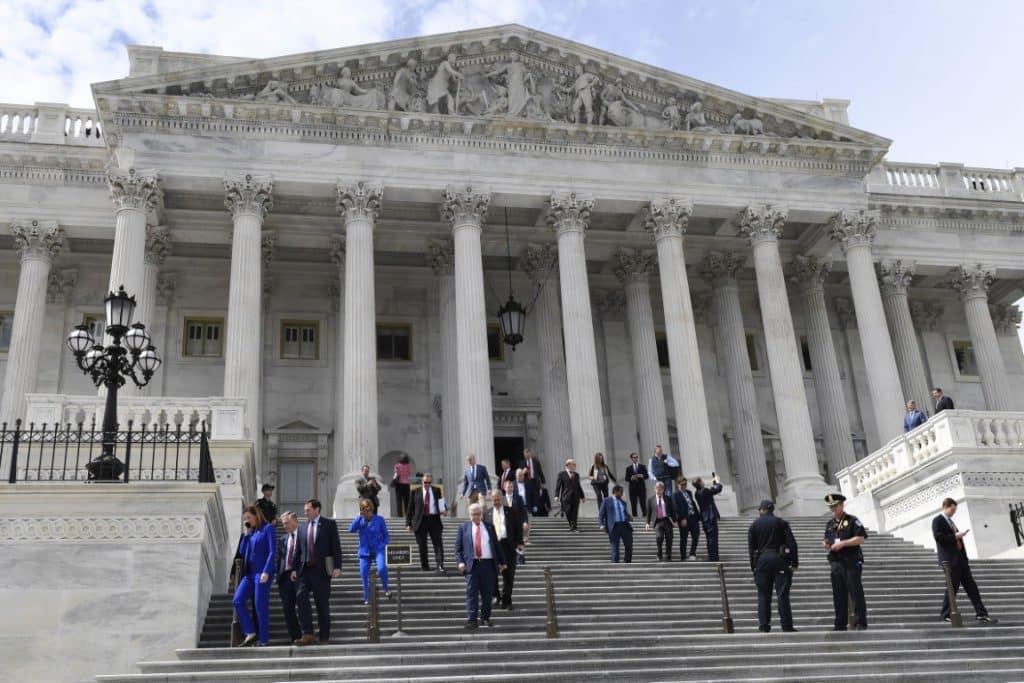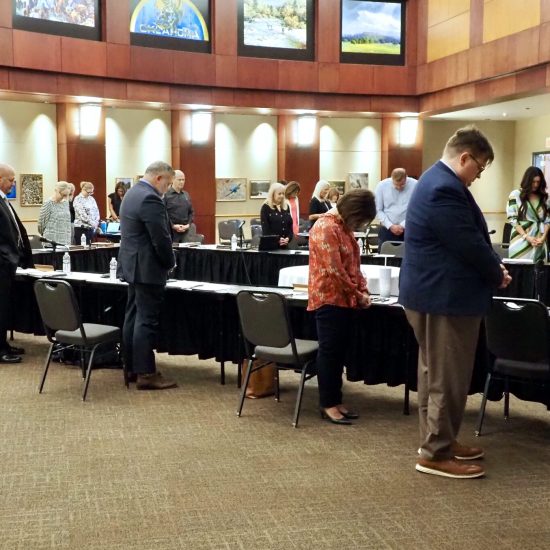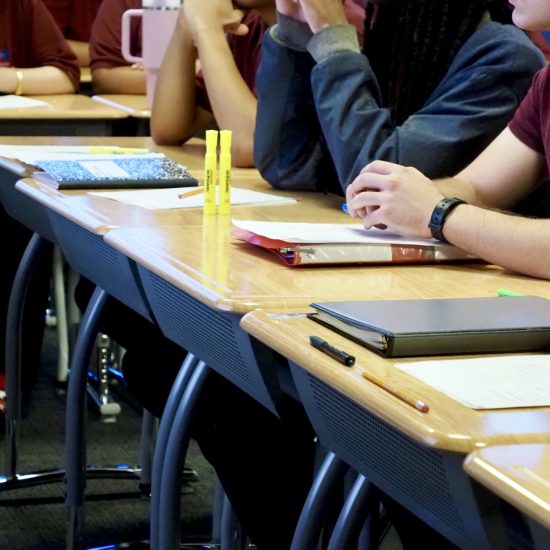

Members of the House of Representatives walk down the steps of Capitol Hill in Washington on March 27, 2020, after passing a coronavirus rescue package known as the CARES Act. The House rushed President Donald Trump a $2.2 trillion rescue package, tossing a life preserver to a U.S. economy and health care system left flailing by the coronavirus pandemic. The Paycheck Protection Program was part of the CARES Act. (AP Photo/Susan Walsh)
(RNS) — I drove to our local bank this morning and dropped off our application for the Paycheck Protection Program, which is administered by the Small Business Administration to help businesses make payroll while their revenues decline significantly due to COVID-19.
Our business is a church.
I’m the pastor.
The rules for the Paycheck Protection Program allow nonprofit organizations — including churches like ours — to apply for these loans. I must admit that I am not completely comfortable with that. As a Baptist pastor, I belong to a tradition that is rooted in a deep skepticism of government entanglement with religion, especially government funding for clergy salaries.
The First Baptist Church in America was founded in 1638 in Providence, Rhode Island, by the fiery Puritan minister Roger Williams. One of the most enduring parts of Williams’ theology was a strict separation of church and state. In fact, when Thomas Jefferson famously wrote to the Danbury Baptists about “a wall of separation,” he was paraphrasing Williams’ language two centuries earlier when Williams advocated for a “hedge or wall of Separation between the Garden of the Church and the Wildernes of the world.”

Statue of Roger Williams at Roger Williams University in Bristol, Rhode Island. Photo by Bill Price III/Creative Commons
Today, our Baptist church, which was founded in part on the separation of church and state, is applying for taxpayer dollars to pay my salary and that of our part-time secretary. Williams might not approve.
Russell Moore, president of the Ethics and Religious Liberty Commission for the Southern Baptist Convention, on the other hand, believes the loans are acceptable for Baptist churches. He stated recently that he saw no theological or legal issues with churches applying for funds under the Paycheck Protection Program. His logic was that local banks — rather than the government — are providing the money for loans, which are backed by the Small Business Administration.
Still, Moore must know that almost all of these loans will be forgiven in the near future — meaning any loans to churches will, in effect, become government grants for religious purposes.
When the idea came up for our church to apply for the program, I approached the congregation’s leadership with some trepidation. I didn’t know how many of them would support our putting in an application. We are a small church now — just 20 active members — but once had pews filled with some of the upper crust of our local community.
It’s a humbling position to be in.
We have also gone through some significant financial hardships as our membership has declined. In fact, just last year we gave our building away to a local Christian school. We just couldn’t afford the utilities, maintenance and insurance costs of a 15,000-square-foot facility any longer. Luckily, the school still allows us to worship there free of charge on Sundays.
Therefore, our request for a Small Business Administration loan is small — much less than $10,000.
For some reason, that seemed to matter to me and the pragmatic leaders of our small church community. We weren’t asking for a lot. Our overhead is incredibly low now — payroll, some funds to buy flowers for funerals, a bit of literature we buy for our shut-ins.
If the money doesn’t come through, we will find a way to make ends meet. But I worry about the bigger churches in our community. The ones that are carrying hefty mortgages, that have to make payroll for dozens of full-time staff members. They are being put in a terrible position.
There seems to be a cottage industry of people who look for egregious examples of pastors asking for money on television or online. While the angry mob focuses its ire on prosperity preachers like Creflo Dollar who need a new private jet, many pastors making these appeals this week just want to make sure that they don’t have to lay off the janitor or the part-time nursery worker.
Churches have bills, too. Can we just show those pastors a bit of grace in the coming days?
Twenty-two million people who had a job a month ago are now unemployed. The specific purpose of the Paycheck Protection Program is to keep people off the unemployment rolls. So, while I am well aware of the admonitions of Roger Williams about the government making the garden of God into a wilderness, I also teach public policy at the graduate level. I know all too well about how the laissez-faire position of the government during the Great Depression made everything worse.
Programs like the Paycheck Protection Program will clearly and objectively limit human suffering, an outcome that all of us can agree is a worthy goal — regardless of religious conviction.
So we’ve applied for a loan and hope we get it. And if some of our neighboring churches applied I hope they get it too.
And I pray that Williams, if I ever meet him, will show us a little grace.






